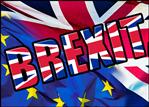
The United Kingdom began the formal process of exiting the European Union on Wednesday after more than four decades of membership, thus entering uncharted territory for negotiations that is set to last two years.
Prime Minister Theresa May's historic letter invoking the Article 50 of the Lisbon Treaty was delivered to the European Council President Donald Tusk in Brussels, thus triggering the Brexit process.
The 6-page letter was hand-delivered by the UK envoy Tim Barrow around 13.20 CET.
In the referendum held on June 23 last year, 52 percent of Britons voted to leave the EU, which the UK joined in 1973.
"This is an historic moment from which there can be no turning back," May said in a statement in the House of Commons, shortly after the Article 50 letter was delivered in Brussels. "Britain is leaving the European Union."
May also said that she was ambitious for Britain and that her country is seeking a "new deep and special partnership" with the EU.
"A partnership of values. A partnership of interests. A partnership based on cooperation in areas such as security and economic affairs," she said.
While many in the UK are celebrating the exit from the EU, May is set to face several tough days ahead as her government juggles with negotiations with the EU and other countries, and the renewed demand for independence by Scotland.
The mood was also tense in Brussels, where EU leaders just marked the 60th anniversary of the Treaties of Rome that led to the formation of the economic union.
"There is no reason to pretend that this is a happy day, neither in Brussels, nor in London," Tusk said in remarks made after accepting May's letter.
"We already miss you," Tusk said.
The EU leader chose to point out the positive side of Brexit, which he said was making the remaining 27 members more determined and more united than before.
He is set to present a proposal of the negotiating guidelines on Friday to be adopted by the European Council on April 29.
In a statement, the European Council expressed regret over the UK leaving the EU, but said the 27 member states were ready for the process that will follow.
The statement also said that the 27 members will act as one and preserve the group's interests in negotiations with the UK. Members also said they will approach talks constructively and strive to find an agreement.
"Our first priority will be to minimize the uncertainty caused by the decision of the United Kingdom for our citizens, businesses and Member States," the European Council said.
"Therefore, we will start by focusing on all key arrangements for an orderly withdrawal."
The EU's Brexit team is ready and will work for the 27 member states, institutions and citizens, EU's Chief Brexit Negotiator Michel Barnier said.
In her Article 50 letter, May reaffirmed that the UK wanted to remain committed partners and allies to European countries.
"We are leaving the European Union, but we are not leaving Europe," she wrote.
"We believe it is necessary to agree the terms of our future partnership alongside those of our withdrawal from the EU," she said.
However, May accepted that it will be a challenge to reach such a comprehensive agreement within the two-year period set out for withdrawal discussions in the Lisbon Treaty. That said, she expressed confidence that a deal can be agreed within the time allotted.
May confirmed that the UK is not seeking membership of the single market, but urged a constructive and respectful engagement in "a spirit of sincere cooperation".
She acknowledged the EU stance that there cannot be any "cherry picking" over the four freedoms of the single market and that leaving the union would mean losing influence over the rules that affect the European economy.
"If, however, we leave the European Union without an agreement the default position is that we would have to trade on World Trade Organisation terms," she added.
She said the Britain will convert the body of the existing EU law, known as the "acquis", into UK law to provide certainty to both British and foreign businesses.
The British premier also sought an early agreement on citizens' rights and implementation periods to adjust in a smooth and orderly way to new arrangements so as to avoid a cliff-edge situation for both people and businesses.
May said her country wanted to maintain the Common Travel Area with Northern Ireland, and to make sure that the UK's withdrawal from the EU does not harm the Republic of Ireland.
She also proposed a "bold and ambitious" Free Trade Agreement with the EU, adding that both parties should begin technical talks on detailed policy areas such as economy and security as soon as possible.
Meanwhile, a leaked European Parliament resolution, which was reported in the press earlier on Wednesday, said that the EU will not agree a free trade deal with the UK in the next two years.
Earlier on Wednesday, Chancellor Philip Hammond said he was confident that the UK would be able to reach a customs deal with the EU to keep borders as friction-less as possible post-Brexit.
by RTT Staff Writer
For comments and feedback: editorial@rttnews.com
Business News

